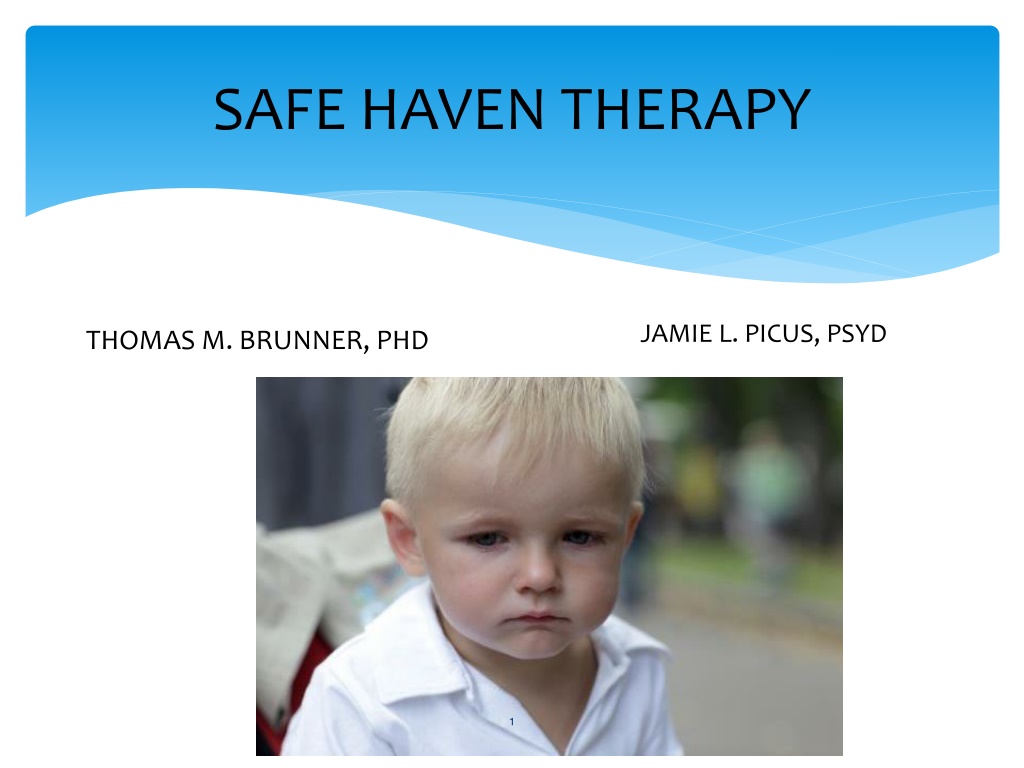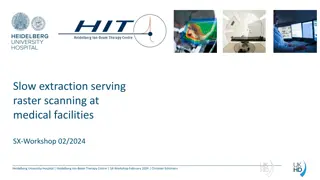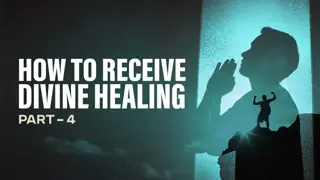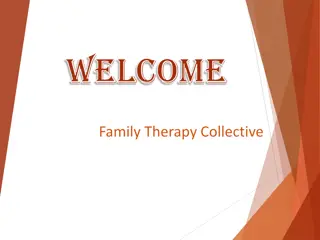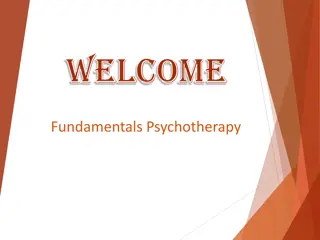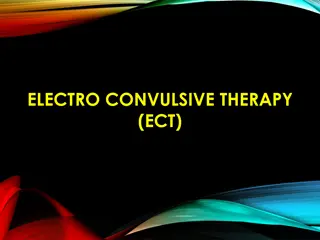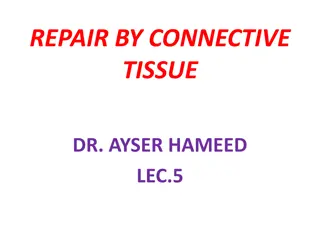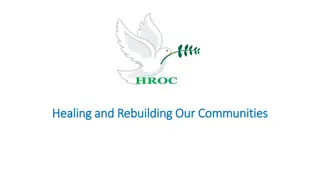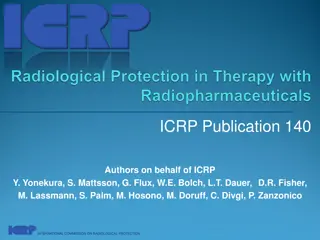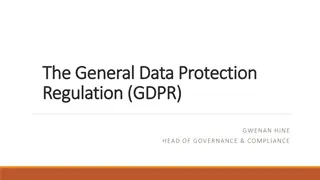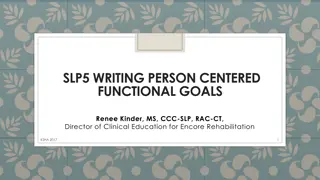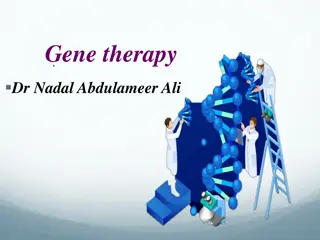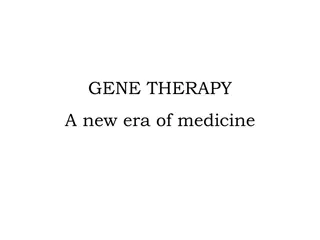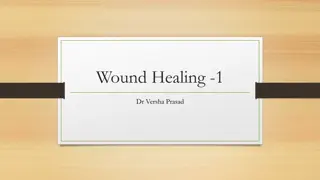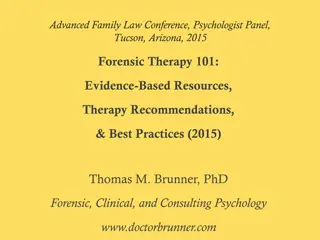Understanding Safe Haven Therapy for Healing and Protection
Safe Haven Therapy, facilitated by Jamie L. Picus, PsyD and Thomas M. Brunner, PhD, focuses on providing a secure and therapeutic environment for children facing harmful parenting behaviors. The therapy involves addressing unhealthy parental actions like refusal to follow recommendations, emotional abuse, and undermining the child's well-being. Through a structured approach, the therapy aims to heal hostility, prevent revenge-driven actions, and protect children from destructive parenting patterns.
Download Presentation

Please find below an Image/Link to download the presentation.
The content on the website is provided AS IS for your information and personal use only. It may not be sold, licensed, or shared on other websites without obtaining consent from the author. Download presentation by click this link. If you encounter any issues during the download, it is possible that the publisher has removed the file from their server.
E N D
Presentation Transcript
SAFE HAVEN THERAPY JAMIE L. PICUS, PSYD THOMAS M. BRUNNER, PHD 1
Table of Contents Rationale & Context Core idea & Child Therapeutic Due Process Relevant Legal & Statutory references Conceptual status: Debate & Divisiveness Key psychological elements of Court Orders Future Considerations 2
Linguistic History of concept Often used with Finite weather phenomenon Beer labels and Retirement plans 4
But the weather we are protecting the child from most often is not a temporary storm 5
Best image? Need consistently THICK walls of containment 6
UNHEALTHY, HARMFUL PARENTING Undermining therapeutic recommendations Refusal to follow recommendations Not letting child speak for self or dictate how the child uses therapy Play on child s feelings, guilt Ridicule or shame child for meeting his/her needs Threaten child with loss of love (can be in passive-aggressive forms) Create conflict with child after talking in therapy and then lay blame on child, other parent or clinician for affecting the child s emotional state Openly violate court orders Make false accusations of physical, sexual or emotional abuse toward other parent Not letting child speak in therapy Verbal, emotional or physical abuse against the other parent or clinician in front of the child in the therapy setting Reject the other parent or clinician in front of the child in therapy setting Encourage child to reject or disrespect other parent or clinician Refuse or lack follow through in therapy or with supports when deemed necessary Encourage child to feign or threaten physical or emotional illness (e.g., threaten suicide) 7
WHY SAFE HAVEN THERAPY? HEALING HOSTILITY, REVENGE & DESTRUCTIVE PARENTING HOSTILE AGGRESSIVE PARENTING and a CHILD S THERAPY Pattern of a parent s behaviors, actions and decision making that directly or indirectly: Creates difficulties between a child and his/her ability to utilize therapy Functions with the goal of damaging a child s relationship with a therapist, which ultimately hinders the ability to utilize the therapy. THIS IS A SERIOUS FORM OF DAMAGE, MALTREATMENT AND ABUSE TO CHILDREN 8
Healing Hostility, Revenge & Aggressive Parenting IMPORTANT FACTS 1) When parents allow their own unresolved grief and parent conflict to become or remain excessive, then the harmful and destructive impact on the children will grow in correspondence. 2) The inability for a parent to contain or manage his/her grief is a serious sign of psychological immaturity, an inability to regulate emotions, and/or a severe inability to empathize with his/her child ultimately meeting parent (unhealthy needs) at the child s expense. 3) Parent empathy is critical for healthy child development. True empathy is free of a parent s projected issues.
How each Parent Views Therapist Degree of rapport widely varies Rarely do both parents fully support throughout See them as a rival or threat Constant scrutinizing Major differences b/t forensic therapy and traditional therapy (See handout) 10
Core Idea & Child Therapeutic Due Process 11
No matter who is doing it. Psychologist, social worker, counselor, etc. Safe Haven/Safe Harbor counselor Court Interventionist Court Appointed therapist 12
What is child therapeutic Due Process? Will not exploit vulnerability Will not violate trust Will not break promise of confidentiality Be loyal Leads to disclosing trauma, secrets, Facilitates corrective cognitive/emotional experiences 13
Therapeutic due Process = Protection of the Therapeutic Alliance Relationship b/t patient and therapist Level of trust How feel about therapist There must be skillful development of: true understanding genuine interest common goals provides comfort & keep secrets Bottom Line to Irvin Yalom: Relationship of trust 14
Why is a Safe Haven SO important? Single greatest indicator of which children will be resilientin face of challenging situations: Presence of a Mentor 16
Purposes of a safe haven Improve mental health of child Rehabilitate family relationships Provide psychoeducation (PTSD) Facilitate better exchange dynamics Reporting maltreatment Facilitate conflict resolution 17
What kind of access will lead to a leaky therapy alliance? 18
Debate & Divisiveness 19
Core (i.e., widely accepted) idea Have a MH professional who cannot be compelled to testify at court about what the child has said in the counseling sessions, and records of sessions cannot be subpoenaed by parents. Reasoning: Child should have a safe place to talk about his or her concerns and problems without worrying that everything he/she says will end up in court. It preserves doctor-patient privilege for the child. 20
Differing interpretations of Safe Haven In terms of what we are protecting .. Content Records Therapy session conversations with child Conversations with parents Therapist from having to testify/deposition 21
Ultimate Goal: Prevent Child from joining the epidemic population of psychologically impaired divorce survivors 22
Relevant Legal & Statutory References 23
US Supreme Court United States Supreme Court Cases Jaffee v. Redmond is a landmark case holding that a privilege protecting confidential communications between a psychotherapist and her patient promotes sufficiently important interests to outweigh the need for probative evidence, and thereby recognizing the psychotherapist-patient privilege under Rule 501, Federal Rules of Evidence. 518 U.S. 1, 9-10 (1996). The Supreme Court reasoned that [e]ffective psychotherapy . . . depends upon an atmosphere of confidence and trust in which the patient is willing to make a frank and complete disclosure of facts, emotions, memories, and fears. Id. at 10. 24
Around the U.S. At least 8 states have specific statutes regarding permissibility of non-disclosureof a child s mental health records to a parent if non-disclosure is found to be in the child s best interests: Arizona, California, Illinois, Minnesota, North Dakota, Texas, Virginia, and Washington. At least 10 other states allow non-disclosure of a child s mental health records based on applicable privilege statutes 25
AZ ARS 12-2293: Stipulations for Non- release of medical records by a health care provider Core of Statutory Basis So .a therapist may decide the patient (the child) could be harmed by revealing what the child has told the therapist. Specifically, if the therapist states that revealing information to the patient s health care decision maker (i.e., the parent) is reasonably likely to cause substantial harm to the patient (or another person) , Could also apply to processes like testimony or Subpoenas. 26
Unpublished AZ decision on Safe Haven issue Harepoo v. Dahnad, Division 1 of the AZ Court of Appeals Agreed w/ trial court that children s therapy records would not be released to Father, based on therapist s opinion that release of the records would not be in the children s best interests. Memorandum decision references ARS 25-408K (the presumption of a parent s entitlement to the child s records) and its exception if such disclosure would endanger seriously the child s or a parent s physical, mental, moral or emotional health. Trial court s finding that the records would not be released was upheld. This decision does not mention ARS 12-2293B. Harepoo case cannot be cited as precedent in Arizona, unless it qualifies under Supreme Court Rule 111(c), as it is not a published opinion. 27
What if abuse/neglect involving child is alleged? ARS 13-3620 is Arizona s duty to report statute Subsection G provides that release of a child s records does not violate privilege in the case of investigation of child abuse or neglect proceedings. So even if abuse or neglect is alleged and is the subject of police or agency investigations, no one can assert privilege to prevent the production of therapy records. 28
Conceptual status: Debate & Divisiveness 29
Problem 1: Im out!!! What do clinician s do when pulled into court or have to testify? Answer: Termination b/c promise of confidentiality is gone 31
Problem 2: Frontloaded Safe Haven agreements Technically, a therapist must state that access is reasonably likely to cause harm, it stands to reason that the therapy must have already started. Therapist not in position to state that records will cause harm if the records don t exist yet. Safe haven agreements that are signed by the parents before the child s therapy starts, are unreliable and arguably don t meet the statutory standard. Recognize therapist needs to make a finding, after therapy has started, as to whether or not access to records are likely to cause harm. 32
Problem 3: Meaningfulness of evidentiary distinction to child Attorneys: safe haven should NOT protect communications b/t therapist and parent. Retort: Stmt s to parents often deeply intertwined with what child has said to them > pulled into citing child s comments to defend rationale. Then who looks like they are hiding something? Therapist! 33
What is the EVIDENCE that making therapist testify about communication with parents is any less NEGATIVELY impactful to the therapy due process than if therapist made to testify about what child said?
AZ 12-2293 References a record, not what is being discussed or who are the discussants 12-2293. Release of medical records and payment records to patients and health care decision makers; definition A. Except as provided in subsections B and C of this section, on the written request of a patient or the patient's health care decision maker for access to or copies of the patient's medical records and payment records, the health care provider in possession of the record shall provide access to or copies of the records to the patient or the patient's health care decision maker. B. A health care provider may deny a request for access to or copies of medical records or payment records if a health professional determines that either . 36
AZ 12-2293 (contd) 1. Access by the patient is reasonably likely to endanger the life or physical safety of the patient or another person. 2. The records make reference to a person other than a health professional and access by the patient or the patient's health care decision maker is reasonably likely to cause substantial harm to that other person. 3. Access by the patient's health care decision maker is reasonably likely to cause substantial harm to the patient or another person. 4. Access by the patient or the patient's health care decision maker would reveal information obtained under a promise of confidentiality with someone other than a health professional and access would be reasonably likely to reveal the source of the information. 37
Key Psychological elements of Court Orders 38
Handout: Mental health professional based perspective on what safe haven aspects are important, and which have psycholegal implications Blended in with a more generic form from other legal sources related to the matter Could sounds legalistic, but focused therapeutic value of this document If there is legal language, we wove psychological ideas into legal language Some references were from real world sources From various sources attorney and psychological sources 39
(6) Equalization of participation. Use a standard pre-meeting form Allows commensurate input Minimizes surprise complaints Weakens the non-participatory hijacker 40
(12) Informal complaints or concerns about counselor Before elevating to formal complaint, the parent must show a persistent track record of seeking to resolve their concern through a collaborative, ongoing, professional communication and problem solving process with therapist. 41
Criteria for SH success Strong, front loading court order (See Handout) Goes beyond generic recommendations Language to contain specific toxic parent behaviors Minimize parent claiming marginalization (See Handout) MOST IMPORTANT: Retain a bird s eye view of probative claims 42
Future Considerations 43
IS IT WORTH IT? Sharing a child s information can: Damage current trust in therapist Minimize or prevent ability to trust another therapist Undermine years of therapeutic gain Result in LOSS of the ONE neutral support that supports the child s needs ASIDE FROM from the adult issues 44
Goes beyond generic recommendations Cannot just say court ordered therapy Remember image of nuclear reactor Thick walls where necessary Prep - disastrous meltdowns Contain toxicity 45
TRUE GOAL -Since very fragile not merely stabilize but bring some healing and increase resilience 46
Reasons safe haven fails include. Much less defined Most vulnerable May be artificially time-limited Therapist coerced/manipulated/complaints Psycholegal focus = hollow improvements 47
Birds eye view of Probative claims As a Wise person once said: Keep things in proportion 48
Key questions to ask if requesting therapist involvement How much will the evidence seeking matter in 5 years? Is this evidence present elsewhere? Is this evidence likely to manifest elsewhere? Is a Summary of Treatment letter acceptable? Is there another way to get this information? 49
Serious potential problems with requesting various kinds of information 50
